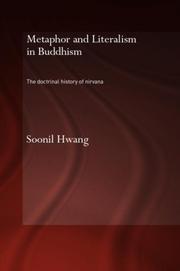| Listing 1 - 3 of 3 |
Sort by
|
Book
ISBN: 1685710352 Year: 2022 Publisher: Goleta, California : Punctum Books,
Abstract | Keywords | Export | Availability | Bookmark
 Loading...
Loading...Choose an application
- Reference Manager
- EndNote
- RefWorks (Direct export to RefWorks)
In the early twentieth century, Uchiyama Gudō, Seno'o Girō, Lin Qiuwu, and others advocated a Buddhism that was radical in two respects. Firstly, they adopted a more or less naturalist stance with respect to Buddhist doctrine and related matters, rejecting karma or other supernatural beliefs. And secondly, they held political and economic views that were radically anti-hegemonic, anti-capitalist, and revolutionary. Taking the idea of such a "radical Buddhism" seriously, A Buddha Land in This World: Philosophy, Utopia, and Radical Buddhism asks whether it is possible to develop a philosophy that is simultaneously naturalist, anti-capitalist, Buddhist, and consistent. Rather than a study of radical Buddhism, then, this book is an attempt to radicalize it. The foundations of this "radicalized radical Buddhism" are provided by a realist interpretation of Yogācāra, elucidated and elaborated with some help from thinkers in the broader Tiantai/Tendai tradition and American philosophers Donald Davidson and W.V.O. Quine. A key implication of this foundation is that only this world and only this life are real, from which it follows that if Buddhism aims to alleviate suffering, it has to do so in this world and in this life. Twentieth-century radical Buddhists (as well as some engaged Buddhists) came to a similar conclusion, often expressed in their aim to realize "a Buddha land in this world. Building on this foundation, but also on Mahāyāna moral philosophy, this book argues for an ethics and social philosophy based on a definition of evil as that what is or should be expected to cause death or suffering. On that ground, capitalism should be rejected indeed, but utopianism must be treated with caution as well, which raises questions about what it means - from a radicalized radical Buddhist perspective - to aim for a Buddha land in this world.
Buddhism --- Doctrines. --- Philosophy. --- Buddhist doctrines --- Buddhist theology --- Lamaist doctrines

ISBN: 9780415346528 9780415600002 0415346525 0415600006 9786610217410 1134279418 1280217413 0203010574 9780203010570 9781134279364 9781134279401 9781134279418 113427940X Year: 2006 Publisher: London New York : RoutledgeCurzon,
Abstract | Keywords | Export | Availability | Bookmark
 Loading...
Loading...Choose an application
- Reference Manager
- EndNote
- RefWorks (Direct export to RefWorks)
David Webster explores the notion of desire as found in the Buddhist Pali Canon. Beginning by addressing the idea of a 'paradox of desire', whereby we must desire to end desire, the varieties of desire that are articulated in the Pali texts are examined. A range of views of desire, as found in Western thought, are presented as well as Hindu and Jain approaches. An exploration of the concept of ditthi(view or opinion) is also provided, exploring the way in which 'holding views' can be seen as analogous to the process of desiring. Other subjects investigated include the mind-body relati
Desire --- Buddhism --- Religious aspects --- Buddhism. --- Doctrines. --- Buddhist doctrines --- Buddhist theology --- Lamaist doctrines --- Desire - Religious aspects - Buddhism. --- Buddhism - Doctrines. --- thought --- pali --- ears --- view --- hindu --- position --- robert --- morrison --- rhys --- davids

ISBN: 1134254350 1280549467 9786610549467 0203001931 1134254342 0415355508 0415650100 Year: 2006 Publisher: Taylor & Francis
Abstract | Keywords | Export | Availability | Bookmark
 Loading...
Loading...Choose an application
- Reference Manager
- EndNote
- RefWorks (Direct export to RefWorks)
Soonil Hwang studies the doctrinal development of nirvana in the Pali Nikaaya and subsequent tradition and compares it with the Chinese aagama and its traditional interpretation. He clarifies early doctrinal developments of Nirvana and traces the word and related terms back to their original metaphorical contexts, elucidating diverse interpretations and doctrinal and philosophical developments in the abhidharma exegeses and treatises of Southern and Northern Buddhist schools. The book finally examines which school, if any, kept the original meaning and re
Nirvana. --- Agama. --- Utopias --- Buddhism --- Religious aspects --- Buddhism. --- Doctrines. --- Buddhist doctrines --- Buddhist theology --- Lamaist doctrines --- Ideal states --- States, Ideal --- Utopian literature --- Political science --- Socialism --- Voyages, Imaginary --- Dystopias --- Agamidae --- Eightfold Path --- Eschatology --- early --- canon --- nirvana --- theory --- metaphorical --- structure --- elements --- louis --- delas --- buddhist
| Listing 1 - 3 of 3 |
Sort by
|

 Search
Search Feedback
Feedback About
About Help
Help News
News